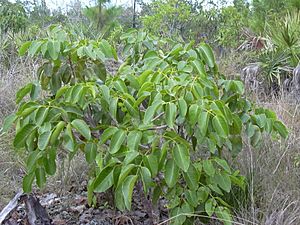Metopium facts for kids
Quick facts for kids Metopium |
|
|---|---|
 |
|
| Metopium toxiferum | |
| Scientific classification |
|
| Kingdom: | Plantae |
| Clade: | Tracheophytes |
| Clade: | Angiosperms |
| Clade: | Eudicots |
| Clade: | Rosids |
| Order: | Sapindales |
| Family: | Anacardiaceae |
| Subfamily: | Anacardioideae |
| Genus: | Metopium P.Browne |
| Type species | |
| Metopium brownei (Jacq.) Urb.
|
|
| Species | |
|
See text |
|
Metopium, often called poisonwood, is a group of flowering plants. These plants are usually trees and belong to the sumac family, known as Anacardiaceae. They are famous for their sap, which can cause an itchy skin rash if it touches you. This type of rash is known as contact dermatitis.
Contents
Understanding Poisonwood
Metopium trees are found in warm, tropical areas. They are known for their strong wood and their unique way of growing. One interesting fact about Metopium plants is that they are dioecious. This means that individual trees are either male or female. A male tree produces pollen, and a female tree produces seeds.
What Makes Poisonwood Poisonous?
The sap of Metopium trees contains special chemicals that can cause a reaction on your skin. If you touch the sap, or even parts of the plant that have sap on them, you might get a red, itchy rash. This is similar to how poison ivy or poison oak can affect people. It's always best to be careful around these trees and avoid touching them.
Where Does Poisonwood Grow?
Metopium species are mostly found in the Americas. They grow in places like Florida in the United States, parts of Mexico, Central America, and the Caribbean islands. These trees prefer warm climates and can often be seen in forests or along coastlines.
Different Kinds of Metopium
As of August 2021, scientists recognize four main types of Metopium plants. Each one has its own specific name and can be found in different regions.
- Metopium brownei — This species is often called black poisonwood.
- Metopium gentlei
- Metopium toxiferum — This one is known as Florida poisonwood and is common in Florida.
- Metopium venosum — This species is sometimes called Cuban poisonwood.
See also
 In Spanish: Metopium para niños
In Spanish: Metopium para niños
 | William L. Dawson |
 | W. E. B. Du Bois |
 | Harry Belafonte |

